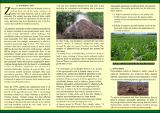| dc.contributor.author | Jesuit Centre for Theological Reflection | |
| dc.date.accessioned | 2021-01-12T09:44:28Z | |
| dc.date.available | 2021-01-12T09:44:28Z | |
| dc.date.issued | 2015 | |
| dc.identifier.citation | JCTR (2006). Sustainable agricultural practices and adaptation to climate change. Lusaka. Zambia: Jesuit Centre for Theological Reflection (JCTR). | en |
| dc.identifier.uri | https://repository.jctr.org.zm/handle/20.500.14274/210 | |
| dc.description | The main thing is climate change, it's causes, consequences and the solution is sustainable agriculture. This is mainly to address issues faced in the agricultural sector. | en |
| dc.description.abstract | Deforestation, which in Zambia is mainly caused by charcoal production, has destroyed many natural habitats. Agricultural land has been degraded as a result of deforestation and inappropriate agricultural practices. erosion; external fertilisers. fertility because it increases the organic matter Sustainable agriculture is different from conventional agriculture. Sustainable agriculture has the following basic features: · It helps to improve internal nutrient cycles on the content of the soil and minimises losses from soil erosion and It helps to maintain or improve soil quality and farm and in turn this reduces the dependence on external fertiliser. | en |
| dc.language.iso | en | en |
| dc.publisher | Jesuit Centre for Theological Reflection | en |
| dc.rights | Attribution-NonCommercial-ShareAlike 3.0 United States | * |
| dc.rights.uri | http://creativecommons.org/licenses/by-nc-sa/3.0/us/ | * |
| dc.subject | sustainable agriculture | en |
| dc.subject | climate change | en |
| dc.subject | agricultural adaptation | en |
| dc.title | Sustainable Agricultural Practices And Adaptation to Climate Change | en |
| dc.type | Brochure | en |

